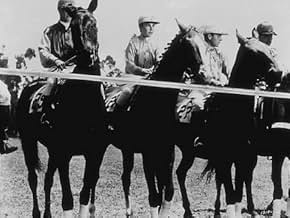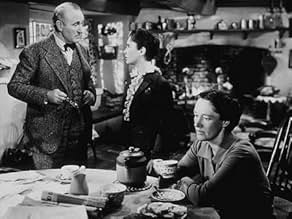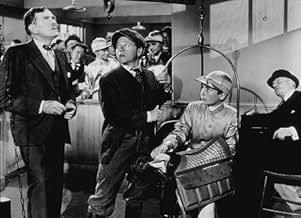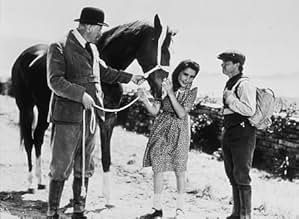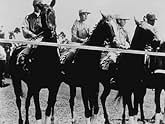Un ex fantino stanco aiuta una giovane ragazza a preparare il suo cavallo selvaggio ma dotato per il Grand National Sweepstakes d'Inghilterra.Un ex fantino stanco aiuta una giovane ragazza a preparare il suo cavallo selvaggio ma dotato per il Grand National Sweepstakes d'Inghilterra.Un ex fantino stanco aiuta una giovane ragazza a preparare il suo cavallo selvaggio ma dotato per il Grand National Sweepstakes d'Inghilterra.
- Regia
- Sceneggiatura
- Star
- Vincitore di 2 Oscar
- 6 vittorie e 5 candidature totali
Jackie 'Butch' Jenkins
- Donald Brown
- (as Jackie Jenkins)
Recensioni in evidenza
During the 13 years of schooling I had from Kindergarten through high school, there was only one day that my class took a field trip. When I went to school, you went to school, from 8:30 until 3:30 and filed trips were not taken. But, for some reason I could not recall at this advanced age, we went to see a movie - National Velvet. I do not recall the movie, so, on the eve of my 57th year, I decided to revisit it.
It is a movie about a time that no longer exists. A time when people trusted others and didn't lock their houses. A time when people were given the benefit of the doubt. It was a time when family was the most important thing. This film shows all of that and more. It shows love and trust and caring and the goodness of people.
It would not be a bad thing for every family to view this film once in a while and discuss its message.
It was a treat to see the young Elizabeth Taylor, Mickey Rooney at his best, the Academy Award-winning performance of Anne Revere, Angela Lansbury before Murder, She Wrote, and Donald Crisp, who performed for almost sixty years.
What a movie!
It is a movie about a time that no longer exists. A time when people trusted others and didn't lock their houses. A time when people were given the benefit of the doubt. It was a time when family was the most important thing. This film shows all of that and more. It shows love and trust and caring and the goodness of people.
It would not be a bad thing for every family to view this film once in a while and discuss its message.
It was a treat to see the young Elizabeth Taylor, Mickey Rooney at his best, the Academy Award-winning performance of Anne Revere, Angela Lansbury before Murder, She Wrote, and Donald Crisp, who performed for almost sixty years.
What a movie!
If you last saw National Velvet with a Saturday matinée serial, for a ticket price of twenty-five cents (including popcorn) -- and you purchased the video to see it again with family -- be prepared to re-experience primal feelings from the early dawn of your history. Warm, wet tears will run down your cheeks. Warm, happy feelings will make you stand up and cheer, as if the posse were galloping to the rescue; but most of all, you will feel good -- it will happen often while viewing National Velvet. See the video many times -- cry and use a handkerchief (remember that piece of cloth mom tucked into your shirt pocket) -- jump up from the sofa and cheer; and FEEL GOOD again -- and again.
National Velvet was initially released in 1944; but I must have seen a re-release soon thereafter -- because I know that I was in grade school at the time. I did not see it again until I bought the DVD for my mother recently. And if asked what the movie was about, during that interim period of more than fifty years, I would have answered -- "it's about a horse." That's a boy's initial and lasting impression.
Animal lovers, (I'm sorry, but) National Velvet is not a horsey movie (and never has been)-- the film is really about the pre-teen innocence and enthusiasm of Velvet Brown (Elizabeth Taylor). No animal -- not the film's sorrel gelding, nor Charlie, my yellow labrador -- can compete with the budding beauty of Elizabeth Taylor for the camera's attention. But, stay focused on Velvet's three interwoven relationships -- with Mi Taylor (Mickey Rooney), with her mother (Anne Revere, best supporting actress Academy Award), and the horse, Pirate ("Pi"). What characterizes winsome Velvet, in these attachments, is a 12-year old's single mindedness of commitment and trust, together with her unwaivering loyalty -- admirable qualities also of Ms. Taylor in real life. Mi, whose father mentored Mrs. Brown, is a young itinerant from less fortunate circumstances, with a working knowledge of jumping horses. Mrs. Brown, ever mindful of her own growing experiences, is especially supportive of both her daughter and Mi. The spirited Pi is difficult handling for its owner, and the horse soon becomes a project for Mi and Velvet.
Angela Lansbury (Velvet's older sister, Edwina, aka TV's Jessica Fletcher fifty years later), Jackie Jenkins (the young brother), and particularly Donald Crisp (Mr. Brown, Velvet's father and village butcher) provide able and entertaining support roles. National Velvet received five Academy nominations, winning two.
Set in the 1920's English coastal village of Sewels and its green pasturelands (on location in Carmel, California), Enid Bagnold's book (1933)and the film (1944) tell us a lot about the moral and social structure of small villages (and our small towns, too). One meaningful scene shows Mrs. Brown stowing money in a kitchen pot on her pantry shelf, while Mi spies from the window -- we are wary of what he might do next. Villagers could be suspicious of strangers but they also extended trust, believing in a person's goodness. Front doors were left open -- grandparents will tell of neighbors regularly walking into an empty house, through the unlatched screen, to borrow a cup of sugar from the same cupboard where family monies were stored (my mother kept petty cash in an unused sugar bowl). Honesty was important, but entrusting friends and neighbors was equally valued. That unlatched screen with open front door was a symbol of our neighborliness and trust, and a more meaningful symbol of the times we lived in -- and yes, maybe it said something about our innocence too.
National Velvet was initially released in 1944; but I must have seen a re-release soon thereafter -- because I know that I was in grade school at the time. I did not see it again until I bought the DVD for my mother recently. And if asked what the movie was about, during that interim period of more than fifty years, I would have answered -- "it's about a horse." That's a boy's initial and lasting impression.
Animal lovers, (I'm sorry, but) National Velvet is not a horsey movie (and never has been)-- the film is really about the pre-teen innocence and enthusiasm of Velvet Brown (Elizabeth Taylor). No animal -- not the film's sorrel gelding, nor Charlie, my yellow labrador -- can compete with the budding beauty of Elizabeth Taylor for the camera's attention. But, stay focused on Velvet's three interwoven relationships -- with Mi Taylor (Mickey Rooney), with her mother (Anne Revere, best supporting actress Academy Award), and the horse, Pirate ("Pi"). What characterizes winsome Velvet, in these attachments, is a 12-year old's single mindedness of commitment and trust, together with her unwaivering loyalty -- admirable qualities also of Ms. Taylor in real life. Mi, whose father mentored Mrs. Brown, is a young itinerant from less fortunate circumstances, with a working knowledge of jumping horses. Mrs. Brown, ever mindful of her own growing experiences, is especially supportive of both her daughter and Mi. The spirited Pi is difficult handling for its owner, and the horse soon becomes a project for Mi and Velvet.
Angela Lansbury (Velvet's older sister, Edwina, aka TV's Jessica Fletcher fifty years later), Jackie Jenkins (the young brother), and particularly Donald Crisp (Mr. Brown, Velvet's father and village butcher) provide able and entertaining support roles. National Velvet received five Academy nominations, winning two.
Set in the 1920's English coastal village of Sewels and its green pasturelands (on location in Carmel, California), Enid Bagnold's book (1933)and the film (1944) tell us a lot about the moral and social structure of small villages (and our small towns, too). One meaningful scene shows Mrs. Brown stowing money in a kitchen pot on her pantry shelf, while Mi spies from the window -- we are wary of what he might do next. Villagers could be suspicious of strangers but they also extended trust, believing in a person's goodness. Front doors were left open -- grandparents will tell of neighbors regularly walking into an empty house, through the unlatched screen, to borrow a cup of sugar from the same cupboard where family monies were stored (my mother kept petty cash in an unused sugar bowl). Honesty was important, but entrusting friends and neighbors was equally valued. That unlatched screen with open front door was a symbol of our neighborliness and trust, and a more meaningful symbol of the times we lived in -- and yes, maybe it said something about our innocence too.
Velvet Brown (Elizabeth Taylor) lives in the small town of Sewels in Sussex, England with her parents, two sisters and a little brother. She's horse obsessed. She befriends poor drifter Mi Taylor (Mickey Rooney) who has come to town after finding Mrs. Brown's address among his late father's belongings. They run across an escaped horse and Velvet names him Pie. Mrs. Brown takes Mi in and gets him a job. His father coached Mrs. Brown for her English Channel swim but she doesn't tell him at first. Mi was once a jockey but he hates horses now after an incident. He notices the height that Pie can jump. After yet another escape attempt, Mr. Edes is forced to pay and puts up Pie for raffle. Velvet wins and ends up riding him. This is a fun sentimental family movie. Liz Taylor is wide-eyed, plucky and adorable. Mickey Rooney is compelling. The horse race is exciting and action-packed even though it is an obvious double on the horse. It's such an old-fashioned heart-warming thrilling underdog movie.
There's a family that enjoys the life it lives (on the south coast on England, late 1920s), that takes in a wayward traveller to give, sustenance and shelter, he becomes the father's helper (delivery boy), and it soon turns out he has much more to give; as he makes a friend of Velvet who desires, and together they combine, devise, conspire, to acquire a race horse (steeplechaser), there's some luck involved of course, although the father is displeased and shows some ire (not for too long though); the said horse is called The Pie and he can fly, jumping obstacles of scale he does not shy, gets a chance to race Grand National, jockey change leads to fantastical, in a beauty of a film, might make you cry.
I watched National Velvet ages ago, before Elizabeth Taylor ( who plays the jockey) befriended Michael Jackson. Anyway, I remembered this movie because of Rachael Blackmore's historic achievement in 2021 to be the first woman to win the Grand National. Art and life and all that, well done to everyone.
Lo sapevi?
- QuizMickey Rooney had to film all of his scenes in one month before he had to report for basic training to serve in World War II.
- BlooperThe horses are shown turning right at one point during the race. All turns on the Grand National course are made to the left.
- Citazioni
Mrs. Brown: That'll be a dispute to the end of time, Mr. Brown: whether it's better to do the right thing for the wrong reason or the wrong thing for the right reason.
- Curiosità sui creditiA frame, with music, was added to the film at the end: "To families of servicemen and women: Pictures exhibited in this theater are given to the armed forces for showing in combat areas around the world. [signed] War Activities Committee/Motion Picture Industry"
- ConnessioniEdited into The Story of Seabiscuit (1949)
- Colonne sonoreGreensleeves
(uncredited)
Traditional English folk song
I più visti
Accedi per valutare e creare un elenco di titoli salvati per ottenere consigli personalizzati
Dettagli
- Tempo di esecuzione
- 2h 3min(123 min)
- Colore
- Proporzioni
- 1.37 : 1
Contribuisci a questa pagina
Suggerisci una modifica o aggiungi i contenuti mancanti


